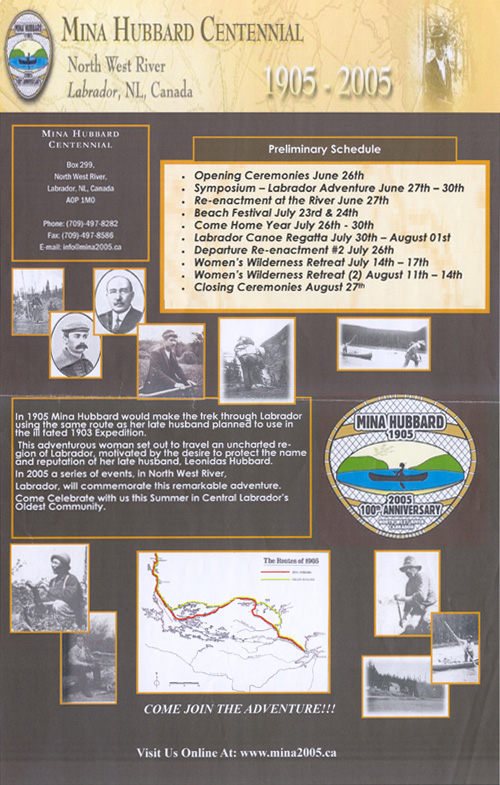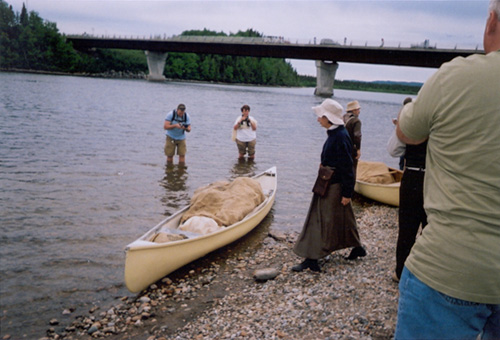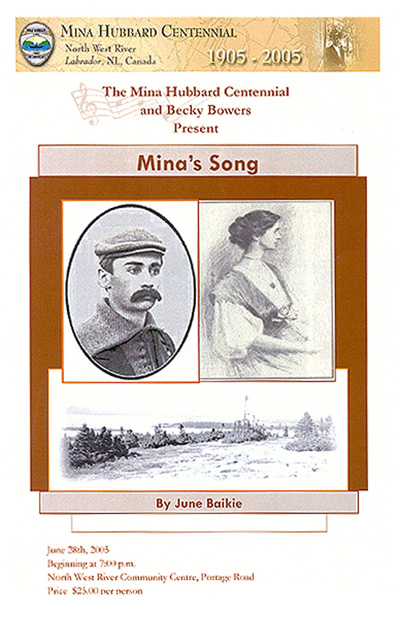|
Sherrill Grace,
"Inventing Mina Benson Hubbard: From her 1905 Expedition
across Labrador to her 2005 Centennial (and Beyond)"
(page 6 of 7)
With the outbreak of WWII, sales of A Woman's Way stopped and
the book went out of print. Outside the tiny community of Northwest
River, Labrador, Mina Benson Hubbard was forgotten for several decades.
But when attention began to refocus on the 1903 tragedy of the first
Hubbard expedition in the 1980s with Davidson and Rugge's book Great
Heart: The History of Labrador Adventure (the epithet "great heart,"
by the way, was Mina's name, borrowed from Pilgrim's Progress,
for George), Mina once more entered the stage, albeit in a very minor
role as the pathetic widow, as the stubborn and secretive competitor to
Dillon Wallace, or as the older woman out to seduce the handsome George.
Other writers to invent Mina have been Margaret Atwood, Pierre Berton,
Clayton Klein (his Mina is a sex-starved widow, and he passes off
fictional letters as real ones), the feminist canoeists Carol Iwata and
Judith Niemi, who did the George River in the early 1980s, Lynn
Noel, who romanticized Mina as a type of Pauline Johnson paddling her
own canoe, in a 1999 song collection called A Woman's Way, Songs and
True Stories of Northern Women Explorers, and the British journalist
Alexandra Pratt who attempted to repeat Mina's expedition with an Innu
guide in 2000, but failed and had to be air-lifted out. She published
her book, Lost Lands, Forgotten Stories: A Woman's Journey to the
Heart of Labrador in 2002. Despite their differences in perspective
and invention, from difficult widow to sexist thriller to feminist
celebration to faithful follower-in-the-steps-of who tries to repeat
Mina's journey, all these inventions, like the most recent
ones—mine, biographer Anne Hart's, and Randall Silvis's 2004 non-fiction
version Heart So Hungry—are by southerners, those who
Labradorians and Newfoundlanders label as "from away," American,
British, and Canadian. However, in 2005 that changed. On the centenary
of her expedition, the tiny community of Northwest River (population
500), assisted by Memorial University's Centre for Labrador Studies,
hosted the Mina Benson Hubbard Centennial (see Illustration 6). Many of us
from away were invited guests, but finally the northerners were going to
get to tell their stories about Leonidas, Mina, Wallace, George, and
their own ancestors who had rescued the 1903 survivors or who had been
on Mina's expedition. It is to these people and their inventions that I
want to turn now.

Illustration 6 The 2005 centennial celebration was organized
by the people of Northwest River, and a display about her expedition is
housed in the former Hudson Bay trading post that now serves as the
region's museum.
First, I must stress the fact that Mina Hubbard is a legendary
figure, along with the men—George, Leonidas, and Wallace—amongst the
"liveyers" (mixed race settlers, not Innu) of Northwest, but she is
especially cherished because they see her as having respected them in
ways that the white men from away rarely did. They also cherish her
because of the sensitive ways in which she responded to their beloved
Labrador.[5]
And like human beings anywhere, although with what I see as
more generosity of spirit, they have to this day a great sympathy for
her personal tragedy, her courage, and her tenacity; for many of them,
Mina's story is a love story—about her dear Laddie and about
their northern home. The centennial of June 2005 had four main
components: a conference on Labrador exploration; a re-enactment of
Mina's expedition setting forth (see Illustration 7); an original play by
Northwest's resident writer, June Baikie, and a film: everything done in
the re-enactment was being filmed as it happened, visitors and locals
were being interviewed during our few days there, and the film crew took
considerable footage of the Grand River, the community, and the
surroundings. Some of us were also flown—by the local airplane
company—over the rivers that feature so dramatically in Leonidas's death
and Mina's success. Many, many things impressed me during this northern
adventure, my first to Labrador, but the one I found most moving was the
staging, in the local community hall, of Baikie's play "Mina Song" (see
Illustration 8). Perhaps because I am an English professor who teaches drama;
perhaps because Mina's grandsons were also in attendance; perhaps
because descendants of those people who had known Mina were performing
in the play; perhaps because Baikie's invention of Mina resonated with
my own; and perhaps because I finally sensed that I had come very close
indeed to something emotionally true and symbolically important by
witnessing this production, perhaps for all these reasons
together, it was the play that made the biggest impact on me. This was
no professional theatre event, but it was valid and genuinely local.
Attending it was a form of field work, for a literary scholar, because I
was watching northerners take ownership—which they had never doubted
they always had—of their own story (see Grace 2006). Here was a
community performing its own myth, living what Pierre Nora calls a
milieux de mémoire. No one from away could do this.

Illustration 7 The opening event of the 2005 conference was
a re-enactment of Mina's embarking on her expedition from the shore in
front of the Hudson Bay trading post in Northwest River. Local
townsfolk dressed in period costume and gathered on the beach to watch
as members of the community, playing the roles of their forebears,
loaded the canoes in preparation. Martha MacDonald played Mina. Others
in the crowd were, like myself, invited conference guests who performed
as witnesses.

Illustration 8 This program is for June Baikie's play "Mina's
Song," which premiered in the local community centre in June 2007. The
play has gone on to have two further productions.
Of course, I am aware of the problematic status of the riverside
re-enactment with Martha MacDonald playing Mina and I acknowledge the
virtual nature of this representation, just as I recognize the
wonderfully imaginative creation of Baikie's Mina. And I shall be
fascinated to see what the filmmaker, Ann Henderson, does with all the
footage her cameramen got of the re-enactment, the conference itself,
and of the participants whom she interviewed. Nevertheless, the play
stands out for me because in it Baikie stayed close to the known facts
of Mina's life and death—even to having a train kill her before her
grandsons' eyes—while at the same time making a powerful contribution to
the northern discourse of Labrador. Her Mina, who adored her
Laddie—as the title song indicates—dies because she thinks she is going
back to Labrador to explore; her Mina calls out as she steps in front of
the train: "I am coming Laddie," coming, that is, into the realm of
death but also home to the northern landscape in which the
historical Mina constantly felt and saw her husband's spirit.
Page: 1 | 2 | 3 | 4 | 5 | 6 | 7
Next page
|